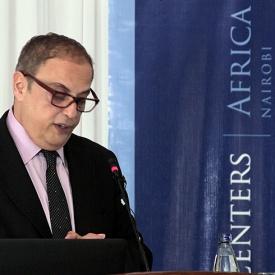The current crisis in the Arab world is directly linked to the long-term, historic failure of education in the Middle East, and will impact the future peace and prosperity in the region following the Arab spring, said Professor Safwan Masri in a Columbia Global Centers | Africa lecture in Nairobi on March 20. To understand the current wave of dissatisfaction, protest and instability sweeping through the region, including the crisis in Syria, Professor Masri traced the history of the Arab world from the Ottoman times to today, through the prism of both politics and education.
The event, held at Strathmore University’s business school, was the inaugural lecture in a series to be hosted by the Nairobi Center throughout 2014. Professor Masri’s distinguished academic career, including his current role as executive vice president for Global Centers and Global Development at Columbia University, provided the basis for his unique insight, shared with a packed hall of Kenyan university students, faculty, and Columbia University alumni and partners.
The era of nation building which followed years of oppression by the Ottoman Empire – and later, the colonial administration – held great promise for citizens in the Arab world. However, the euphoria and optimism of the ’50s and ’60s soon faded as authoritarian regimes at first jostled for control and then settled down for an indefinite, absolute hold on power, during the “dark decades of despotism”, said Masri. Public institutions, and education in particular, was the vehicle by which control over the citizenry was maintained by the state:
“Excluding Arab citizens from the public space by intellectual despotism, wide-spread de-democratization, and uneducating the population has been the objective of the state,” backed up by institutionalized violence and fear, said Masri. “The education sector was a vehicle for autocratic rulers to undermine critical thinking. Youth were trained to not imagine and dream, but to stifle independent thought and decision making.”
As a result of this “closing of the Arab mind,” the Middle East now has some of the most worrying education indicators in the world, despite a relatively high per-capita income in countries such as Qatar and the United Arab Emirates. Although enrollment levels are high across the region, studies show that the quality of education and learning is below global norms.
Part of the problem, according to Masri, lies in the misappropriation of religion in schools and universities as a way to inculcate a culture of passive acceptance of authority.
“Religion is used by the state to discourage different points of view, and instill a non-questioning mentality. Diversity, including religious diversity, is expressly discouraged.”
Intellectual oppression, coupled with a growing youth population and a failure by the state to create jobs and opportunities provided the spark which finally ignited the flames of the Arab spring.
Education therefore has been at the heart of the problems facing the region, and the question still remains as to whether it can shape the future in a positive way.
“Is the forthcoming generation equipped for democracy?” asked Masri. “The recent upheavals have opened up a space for important conversations, but how can we reopen the Arab public space on the foundation of the traditional Arab classroom?”
Education reform, encouraging critical thinking, debate and creativity, holds the key to a prosperous and inclusive future in the Middle East.
A lively debate with the audience followed, with topics ranging from the role of the family in education, the misappropriation and misinterpretation of Islam, and nuanced differences across various countries in the region.
Following the lecture, Professor Masri congratulated Belay Begashaw, the director of the Columbia Global Centers | Africa, on the excellent work the Center has done in linking Columbia University to Kenya and Africa as a whole, and promoting the exchange of learning and ideas evident during the event. The lecture was the first of a series of talks to be held by the Center this year, in partnership with the country’s leading universities. The next lecture, to be held March 27, will be presented by Deqo Mohamed, CEO of the Dr. Hawa Abdi Foundation, a leading Somali grass-roots NGO. Please click here for more information or to attend. The public lecture series provides a platform for debate between Africa’s academic community and the world’s leading intellectuals, and aims to give voice to Africa’s most respected thought leaders on a world scale.
